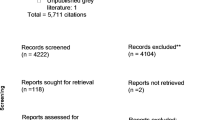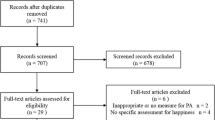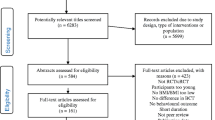Abstract
People with advanced cancer and cachexia experience significant body weight loss, adversely impacting physical function and quality of life (QOL). Effective, evidence-based treatments for cancer cachexia are lacking, leaving patients with unmet needs. Exercise holds promise to improve patient QOL. However, information on patients’ experiences of exercise, including their ability to cope with structured exercise, is limited.
Purpose
To explore patient experiences completing a structured, supervised exercise program for people with cachexia due to advanced cancer.
Methods
Semi-structured interviews were conducted with participants enrolled in a phase II feasibility, randomized controlled trial to explore their experiences of an 8-week virtually supervised exercise program delivered via videoconference technology. Interviews were analysed using reflexive thematic analysis.
Results
Seventeen participants completed interviews (female n = 9, 53%). Main interview themes included the following: (1) Deciding to exercise involves balancing concerns and expectations, (2) the exercise program is a positive experience, and (3) moving forward after the exercise program. While some participants initially held doubts about their physical capabilities and exercise safety, most wanted to exercise to enhance their wellbeing. Participants described the exercise program as a positive experience, offering diverse benefits. Some would have preferred in-person exercise, but all agreed the virtual format increased convenience. Participants emphasized the need to recommend the program to others in similar circumstances. They underscored the necessity and desire for ongoing support to sustain their new exercise habits.
Conclusion
Based on patient experiences, virtually supervised exercise programming appears to be feasible and meaningful to people with advanced cancer and cachexia.

Similar content being viewed by others
Data availability
No datasets were generated or analysed during the current study.
References
Fearon K, Strasser F, Anker SD et al (2011) Definition and classification of cancer cachexia: an international consensus. Lancet Oncol 12:489–495. https://doi.org/10.1016/S1470-2045(10)70218-7
Von Haehling S, Anker MS, Anker SD (2016) Prevalence and clinical impact of cachexia in chronic illness in Europe, USA, and Japan: facts and numbers update 2016. J Cachex Sarcopenia Muscle 7:507–509. https://doi.org/10.1002/jcsm.12167
Le-Rademacher J, Lopez C, Wolfe E et al (2020) Weight loss over time and survival: a landmark analysis of 1000+ prospectively treated and monitored lung cancer patients. J Cachex Sarcopenia Muscle 11:1501–1508. https://doi.org/10.1002/jcsm.12625
Martin L, Muscaritoli M, Bourdel-Marchasson I et al (2021) Diagnostic criteria for cancer cachexia: reduced food intake and inflammation predict weight loss and survival in an international, multi-cohort analysis. J Cachex Sarcopenia Muscle 12:1189–1202. https://doi.org/10.1002/jcsm.12756
Zhou T, Yang K, Thapa S et al (2017) Differences in symptom burden among cancer patients with different stages of cachexia. J Pain Symptom Manage 53:919–926. https://doi.org/10.1016/j.jpainsymman.2016.12.325
Amano K, Baracos VE, Morita T et al (2022) The impact of cachexia on dietary intakes, symptoms, and quality of life in advanced cancer. JCSM Rapid Commun 5:162–170. https://doi.org/10.1002/rco2.61
Daly LE, Dolan RD, Power DG et al (2020) Determinants of quality of life in patients with incurable cancer. Cancer 126:2872–2882. https://doi.org/10.1002/cncr.32824
Anderson LJ, Lee J, Mallen MC et al (2021) Evaluation of physical function and its association with body composition, quality of life and biomarkers in cancer cachexia patients. Clin Nutr 40:978–986. https://doi.org/10.1016/j.clnu.2020.07.001
Ohmae N, Yasui-Yamada S, Furumoto T et al (2023) Muscle mass, quality, and strength; physical function and activity; and metabolic status in cachectic patients with head and neck cancer. Clin Nutr ESPEN 53:113–119. https://doi.org/10.1016/j.clnesp.2022.12.006
Takayama K, Atagi S, Imamura F et al (2016) Quality of life and survival survey of cancer cachexia in advanced non-small cell lung cancer patients—Japan nutrition and QOL survey in patients with advanced non-small cell lung cancer study. Support Care Cancer 24:3473–3480. https://doi.org/10.1007/s00520-016-3156-8
Sun H, Sudip T, Fu X et al (2023) Cachexia is associated with depression, anxiety and quality of life in cancer patients. BMJ Support Palliat Care 13:e129–e135. https://doi.org/10.1136/bmjspcare-2019-002176
Nipp RD, Fuchs G, El-Jawahri A et al (2018) Sarcopenia is associated with quality of life and depression in patients with advanced cancer. Oncologist 23:97–104. https://doi.org/10.1634/theoncologist.2017-0255
Wendrich AW, Swartz JE, Bril SI et al (2017) Low skeletal muscle mass is a predictive factor for chemotherapy dose-limiting toxicity in patients with locally advanced head and neck cancer. Oral Oncol 71:26–33. https://doi.org/10.1016/j.oraloncology.2017.05.012
Cespedes Feliciano EM, Lee VS, Prado CM et al (2017) Muscle mass at the time of diagnosis of nonmetastatic colon cancer and early discontinuation of chemotherapy, delays, and dose reductions on adjuvant FOLFOX: the C-SCANS study. Cancer 123:4868–4877. https://doi.org/10.1002/cncr.30950
Sjøblom B, Grønberg BH, Benth JŠ et al (2015) Low muscle mass is associated with chemotherapy-induced haematological toxicity in advanced non-small cell lung cancer. Lung Cancer 90:85–91. https://doi.org/10.1016/j.lungcan.2015.07.001
De Jong C, Chargi N, Herder GJM et al (2022) The association between skeletal muscle measures and chemotherapy-induced toxicity in non-small cell lung cancer patients. J Cachex Sarcopenia Muscle 13:1554–1564. https://doi.org/10.1002/jcsm.12967
Baracos VE, Coats AJ, Anker SD et al (2022) Identification and management of cancer cachexia in patients: assessment of healthcare providers’ knowledge and practice gaps. J Cachex Sarcopenia Muscle 13:2683–2696. https://doi.org/10.1002/jcsm.13105
Parmar MP, Vanderbyl BL, Kanbalian M et al (2017) A multidisciplinary rehabilitation programme for cancer cachexia improves quality of life. BMJ Support Palliat Care 7:441–449. https://doi.org/10.1136/bmjspcare-2017-001382
Bland KA, Harrison M, Zopf EM et al (2021) Quality of life and symptom burden improve in patients attending a multidisciplinary clinical service for cancer cachexia: a retrospective observational review. J Pain Symptom Manage 62:e164–e176. https://doi.org/10.1016/j.jpainsymman.2021.02.034
Weller S, Hart NH, Bolam KA et al (2021) Exercise for individuals with bone metastases: a systematic review. Crit Rev Oncolo Hematol 166:103433. https://doi.org/10.1016/j.critrevonc.2021.103433
Mikkelsen MK, Lund CM, Vinther A et al (2022) Effects of a 12-week multimodal exercise intervention among older patients with advanced cancer: results from a randomized controlled trial. Oncologist 27:67–78. https://doi.org/10.1002/onco.13970
De Lazzari N, Niels T, Tewes M, Götte M (2021) A systematic review of the safety, feasibility and benefits of exercise for patients with advanced cancer. Cancers (Basel) 13:4478. https://doi.org/10.3390/cancers13174478
Hanson ED, Alzer M, Carver J et al (2023) Feasibility of home-based exercise training in men with metastatic castration-resistant prostate cancer. Prostate Cancer Prostatic Dis 26:302–308. https://doi.org/10.1038/s41391-022-00523-8
McDonald J, Sayers J, Anker SD et al (2023) Physical function endpoints in cancer cachexia clinical trials: systematic review 1 of the cachexia endpoints series. J Cachex Sarcopenia Muscle 14:1932–1948. https://doi.org/10.1002/jcsm.13321
Arends J, Strasser F, Gonella S et al (2021) Cancer cachexia in adult patients: ESMO Clinical Practice Guidelines☆. ESMO Open 6:100092. https://doi.org/10.1016/j.esmoop.2021.100092
Roeland EJ, Bohlke K, Baracos VE et al (2020) Management of cancer cachexia: ASCO guideline. J Clin Oncol 38:2438–2453. https://doi.org/10.1200/JCO.20.00611
Bland KA, Krishnasamy M, Parr EB et al (2022) “I want to get myself as fit as I can and not die just yet” – perceptions of exercise in people with advanced cancer and cachexia: a qualitative study. BMC Palliat Care 21:75. https://doi.org/10.1186/s12904-022-00948-x
Gonzalo-Encabo P, Wilson RL, Kang D-W et al (2022) Exercise oncology during and beyond the COVID-19 pandemic: are virtually supervised exercise interventions a sustainable alternative? Crit Rev Oncol Hematol 174:103699. https://doi.org/10.1016/j.critrevonc.2022.103699
O’Brien BC, Harris IB, Beckman TJ et al (2014) Standards for reporting qualitative research: a synthesis of recommendations. Acad Med 89:1245–1251. https://doi.org/10.1097/ACM.0000000000000388
Williams N (2017) The Borg Rating of Perceived Exertion (RPE) scale. Occup Med 67:404–405. https://doi.org/10.1093/occmed/kqx063
Braun V, Clarke V (2006) Using thematic analysis in psychology. Qual Res Psychol 3:77–101. https://doi.org/10.1191/1478088706qp063oa
Bartlett SJ (1983) Conceptual therapy: an introduction to framework-relative epistemology. Studies in Theory and Beahvior, St. Louis, USA
Gale N, Hopkinson J, Wasley D, Byrne A (2023) The promotion of homebased physical activity for people with lung cancer and cachexia, a qualitative study of healthcare professionals, patients and carers. J Cancer Surviv 17:677–685. https://doi.org/10.1007/s11764-023-01376-3
Depenbusch J, Sweegers MG, Aaronson NK et al (2023) PERSPECTIVEs on supervised exercise programs in people with metastatic breast cancer- a qualitative study in four European countries. Support Care Cancer 31:281. https://doi.org/10.1007/s00520-023-07739-x
Mikkelsen MK, Michelsen H, Nielsen DL et al (2022) “Doing what only I can do”: experiences from participating in a multimodal exercise-based intervention in older patients with advanced cancer—a qualitative explorative study. Cancer Nurs 45:E514–E523. https://doi.org/10.1097/NCC.0000000000000987
Ten Tusscher MR, Groen WG, Geleijn E et al (2019) Physical problems, functional limitations, and preferences for physical therapist-guided exercise programs among Dutch patients with metastatic breast cancer: a mixed methods study. Support Care Cancer 27:3061–3070. https://doi.org/10.1007/s00520-018-4619-x
Malcolm L, Mein G, Jones A et al (2016) Strength in numbers: patient experiences of group exercise within hospice palliative care. BMC Palliat Care 15:97. https://doi.org/10.1186/s12904-016-0173-9
Paltiel H, Solvoll E, Loge JH et al (2009) “The healthy me appears”: palliative cancer patients’ experiences of participation in a physical group exercise program. Palliat Supp Care 7:459–467. https://doi.org/10.1017/S1478951509990460
Turner K, Tookman A, Bristowe K, Maddocks M (2016) ‘I am actually doing something to keep well. That feels really good’: experiences of exercise within hospice care. Prog Palliat Care 24:204–212. https://doi.org/10.1080/09699260.2015.1123441
Midtgaard J, Stelter R, Rørth M, Adamsen L (2007) Regaining a sense of agency and shared self-reliance: the experience of advanced disease cancer patients participating in a multidimensional exercise intervention while undergoing chemotherapy – analysis of patient diaries. Scand J Psychol 48:181–190. https://doi.org/10.1111/j.1467-9450.2007.00562.x
Reid J, McKenna H, Fitzsimons D, McCance T (2009) The experience of cancer cachexia: a qualitative study of advanced cancer patients and their family members. Int J Nurs Stud 46:606–616. https://doi.org/10.1016/j.ijnurstu.2008.10.012
Tarachandani A, Karahanoglu FI, Messere A et al (2023) Patient willingness to use digital health technologies: a quantitative and qualitative survey in patients with cancer cachexia. Patient Prefer Adherence 17:1143–1157. https://doi.org/10.2147/PPA.S396347
Chang P-H, Lin C-R, Lee Y-H et al (2020) Exercise experiences in patients with metastatic lung cancer: a qualitative approach. PLoS ONE 15:e0230188. https://doi.org/10.1371/journal.pone.0230188
Garcia-Roca ME, Rodriguez-Arrastia M, Ropero-Padilla C et al (2022) Breast cancer patients’ experiences with online group-based physical exercise in a COVID-19 context: a focus group study. J Pers Med 12:356. https://doi.org/10.3390/jpm12030356
Suderman K, Skene T, Sellar C et al (2022) Virtual or in-person: a mixed methods survey to determine exercise programming preferences during COVID-19. Curr Oncol 29:6735–6748. https://doi.org/10.3390/curroncol29100529
Funding
Funding to support this research was provided by the Cabrini Foundation.
Author information
Authors and Affiliations
Contributions
K.A.B., M.K., E.P., L.J.C.vL, P.C., P.M., and E.M.Z. contributed to the study conception and design. Material preparation, data collection, and analysis were performed by K.A.B., M.F.R., and A.N. The first draft of the manuscript was written by K.A.B. and M.F.R., and all authors commented on previous versions of the manuscript. All authors read and approved the final manuscript.
Corresponding author
Ethics declarations
Ethics approval
This study was performed in line with the principles of the Declaration of Helsinki. Approval was granted by the Human Research Ethics Committee (HREC) of St. Vincent’s Hospital Melbourne, Australia (HREC 251/18).
Consent to participate
Informed consent was obtained from all individual participants included in the study.
Consent for publication
All individual participants consented to the publication of their de-identified data.
Competing interests
L.J.C.vL has received research grants, consulting fees, speaking honoraria, or a combination of these, from Kenniscentrum Suiker & Voeding and PepsiCo.
Additional information
Publisher's Note
Springer Nature remains neutral with regard to jurisdictional claims in published maps and institutional affiliations.
Supplementary information
Below is the link to the electronic supplementary material.
Rights and permissions
Springer Nature or its licensor (e.g. a society or other partner) holds exclusive rights to this article under a publishing agreement with the author(s) or other rightsholder(s); author self-archiving of the accepted manuscript version of this article is solely governed by the terms of such publishing agreement and applicable law.
About this article
Cite this article
Bland, K.A., France-Ratcliffe, M., Krishnasamy, M. et al. “It gave me a sense of achievement and a sense of purpose”—a qualitative study of patient experiences of a virtually supervised exercise program for adults with advanced cancer and cachexia. Support Care Cancer 32, 325 (2024). https://doi.org/10.1007/s00520-024-08526-y
Received:
Accepted:
Published:
DOI: https://doi.org/10.1007/s00520-024-08526-y




